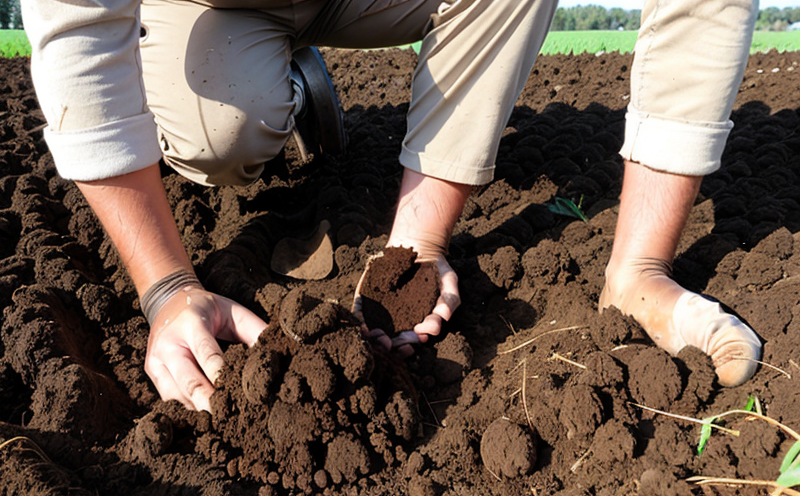Soil Bulk Density Testing
The soil bulk density testing is a critical procedure in agriculture and forestry that evaluates how tightly packed the soil is, thereby determining its ability to support plant growth. This test is fundamental for assessing soil quality and fertility since it provides insights into the pore space availability, which directly impacts root development and nutrient uptake.
Soil bulk density (BD) is defined as the mass of dry soil per unit volume, including pores and solids. It reflects how much solid matter occupies a given volume, distinguishing between the total porosity and air-filled porosity. Understanding BD helps in optimizing crop yields by ensuring that the soil structure supports adequate root growth and water infiltration.
In agricultural and forestry contexts, soil bulk density testing is essential for several reasons:
- It aids in diagnosing soil compaction issues, which can hinder plant establishment and nutrient distribution.
- It assists in selecting appropriate tillage practices that enhance aeration and root penetration.
- It supports the evaluation of soil drainage capabilities to prevent waterlogging and reduce disease prevalence.
The testing process involves several steps. Initially, samples are collected from various depths within the field or forest area using specialized tools such as augers or coring devices. These samples must be representative of the entire plot to ensure accurate results. Once collected, the soil is dried and sieved to remove organic debris and larger particles.
For precise measurement, a graduated cylinder or volumetric flask is used to measure the volume of the soil sample. The mass of the dry soil is then weighed accurately on an analytical balance. The bulk density is calculated using the formula:
The volume measurement must account for both the solid and pore space, making this a complex but necessary process.
Understanding the soil's bulk density helps in optimizing irrigation practices. For instance, knowing how much water is retained by different soils can guide the application rates to avoid overwatering or underwatering. This is crucial not only for agricultural productivity but also for environmental sustainability, as it reduces water waste and supports efficient resource use.
Accurate soil bulk density testing is essential for compliance with international standards such as ISO 17806:2015 for soil and plant samples—determination of bulk density. This standard provides guidelines on sample preparation and the calculation methods, ensuring that tests are conducted consistently across different regions.
Eurolab Advantages
At Eurolab, we pride ourselves on offering superior soil bulk density testing services tailored to meet the specific needs of our clients. Our state-of-the-art laboratory facilities are equipped with advanced instrumentation and experienced technicians who ensure precise results.
- Accurate Results: Our calibrated equipment provides highly accurate measurements that comply with international standards, ensuring reliable data for decision-making.
- Comprehensive Reporting: We offer detailed reports that include all relevant parameters, helping you interpret the results effectively and implement necessary actions promptly.
- Fast Turnaround: Our efficient processes allow us to provide quick turnaround times without compromising on accuracy or quality.
- Expertise: Our team of experts has extensive experience in soil science and testing, providing valuable insights beyond just the test results.
We understand that every client has unique requirements. That's why we offer flexible packages to suit your specific needs, whether you require periodic testing or one-off assessments.
Why Choose This Test
Choosing soil bulk density testing is crucial for several reasons:
- Precise Diagnosis: Identifying the exact state of your soil helps in diagnosing issues such as compaction and nutrient deficiencies.
- Informed Decisions: Data-driven decisions lead to better resource management, whether it's water usage or fertilizer application rates.
- Environmental Benefits: By optimizing soil health, you contribute to sustainable agricultural practices that reduce environmental impact.
- Economic Efficiency: Efficient use of resources translates into cost savings and improved profitability.
Our testing services not only provide insights but also offer actionable recommendations. Our clients have reported significant improvements in crop yields and overall soil health following our testing and advice.
For quality managers, compliance officers, R&D engineers, and procurement teams looking to enhance their operations, soil bulk density testing is an indispensable tool. It ensures that you are making informed decisions based on accurate data, ultimately leading to higher productivity and sustainability.
Environmental and Sustainability Contributions
Soil bulk density testing plays a pivotal role in environmental stewardship by promoting sustainable agricultural practices. By understanding the soil's ability to support plant growth, we can implement strategies that enhance ecosystem health and biodiversity.
- Promotes Efficient Water Use: Knowing your soil's bulk density helps in optimizing irrigation schedules, reducing water waste, and supporting efficient resource use.
- Reduces Soil Erosion: By ensuring optimal soil structure, we can mitigate issues such as erosion and landslides, protecting both land and water resources.
- Supports Biodiversity: Healthy soils are crucial for maintaining diverse ecosystems, which in turn supports a wide range of plant and animal species.
The testing also aids in reducing greenhouse gas emissions. By promoting sustainable farming practices that enhance soil health, we contribute to carbon sequestration and mitigate climate change impacts.
Our commitment to environmental sustainability is reflected in our approach to soil bulk density testing. We provide not only the technical expertise but also the educational resources necessary for clients to implement best practices effectively.





